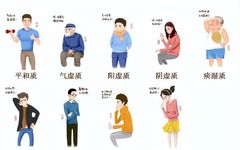The standard for “Classification and Identification of TCM Constitutions” has been officially released, categorizing constitutions into Pinghe Constitution (平和质), Qixu Constitution (气虚质), Yangxu Constitution (阳虚质), Yinxu Constitution (阴虚质), Phlegm-Damp Constitution (痰湿质), Damp-Heat Constitution (湿热质), Blood-Stasis Constitution (血瘀质), Qiyu Constitution (气郁质), and Special Constitution (特禀质). This classification employs interdisciplinary methods from epidemiology, immunology, molecular biology, genetics, and mathematical statistics, established as a standardized tool for constitution identification through multiple validations by TCM clinical experts, epidemiologists, and constitution specialists.
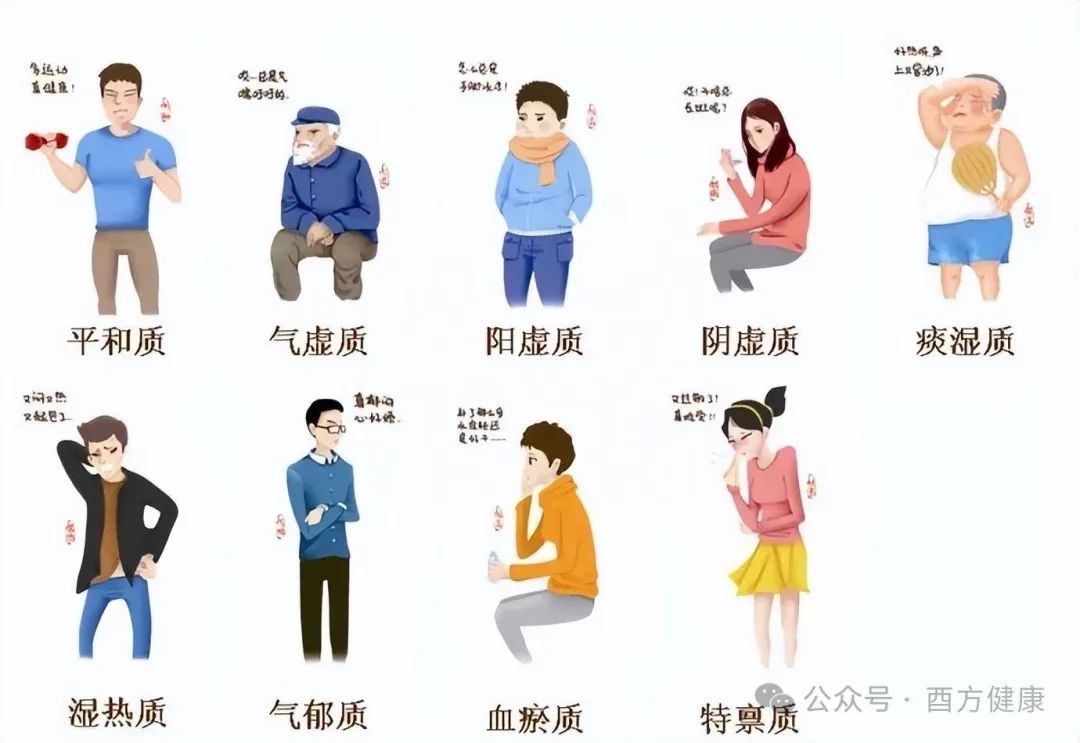
Constitution can be adjusted. It is both innate and influenced by acquired factors. The stability of constitution is formed by similar genetic backgrounds, and factors such as age and gender can also cause certain stability in constitution.
However, the stability of constitution is relative. Throughout the life process of growth and aging, various internal and external factors such as environment, mental state, nutrition, exercise, and diseases can cause changes in constitution. Constitution has relative stability while also possessing dynamic variability. This characteristic is the basis for the adjustability of constitution.
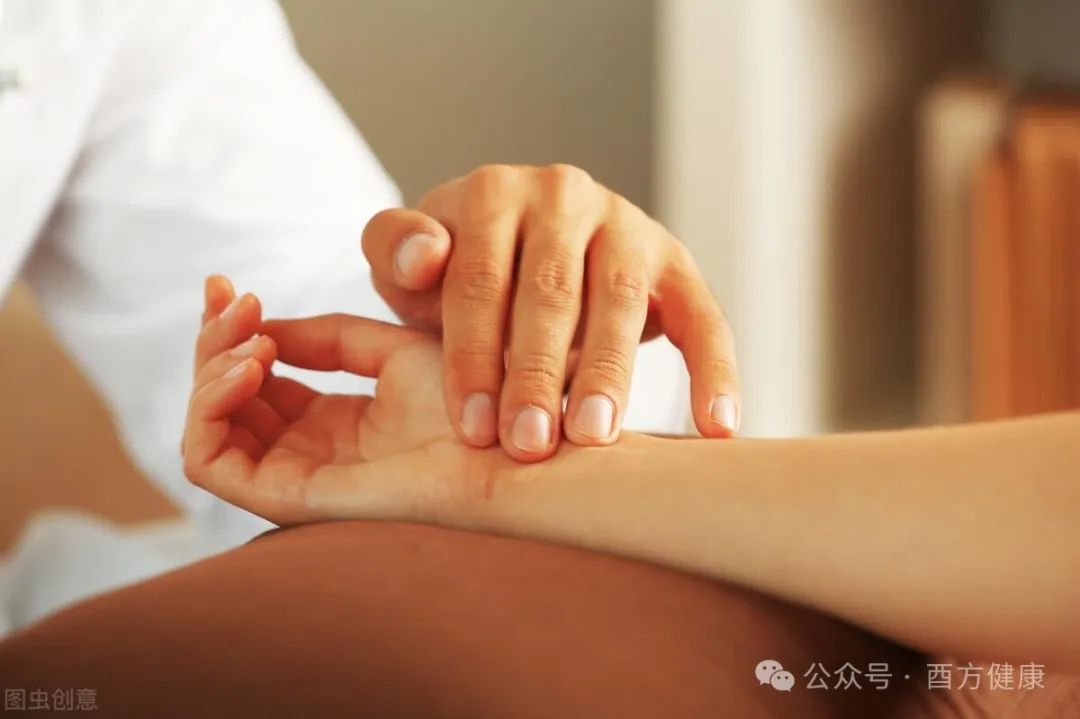
Identifying the root cause of issues allows for appropriate methods to improve constitution. For daily health management, one should understand their constitution and the causes affecting it.
Based on common TCM constitution classifications, we help you quickly assess your constitution.
1. Pinghe Constitution

Overall Characteristics: Pinghe Constitution is a healthy constitution.
Complexion and skin are moist, hair is thick and shiny, eyes are bright, nose is moist, sense of smell is clear, lips are rosy, fatigue is rare, energy is abundant, tolerant to cold and heat, good sleep, normal appetite, normal bowel movements, tongue is light red, thin white coating, pulse is harmonious and strong; personality is easy-going and cheerful, generally less prone to illness; adaptability is strong.
Daily attention should be paid to not overindulging, avoiding harm and disturbance, and following nature.
2. Qixu Constitution

Overall Characteristics:Muscles are not robust, shortness of breath, reluctance to speak, easy fatigue, prone to sweating, eyes lack spirit, mouth is bland, lips lack color, hair is sparse, dizziness, forgetfulness, normal bowel movements, frequent urination; personality is introverted, emotions are unstable; tongue is pale red, tongue body is large with tooth marks, pulse is weak and slow; prone to colds and organ prolapse, intolerant to cold, wind, and heat.
Mainly characterized by weak lung and spleen qi, leading to easy fatigue.
If lung qi is deficient, it manifests as poor adaptability to internal and external environments, fear of cold in winter, fear of heat in summer, and easy sweating; if spleen qi is deficient, it manifests as poor appetite, bloating after eating, difficulty in bowel movements, and weak muscles.
Individuals with Qixu Constitution should tonify the spleen, but first, avoid harming it, such as excessive thinking or physical labor; in terms of diet, consume mild and warming foods, gradually supplementing with items like millet, white lentils, chicken, red dates, longan, Chinese yam, and lotus seeds, and can also use jujube, ginseng, Chinese yam, codonopsis, astragalus, poria, white atractylodes, and coix in soups. Additionally, those with Qixu Constitution can often listen to uplifting music to enhance positive energy and relieve fatigue.
3. Yangxu Constitution

Overall Characteristics:Often plump, spirit is low, generally afraid of cold, hands and feet are cold, prefer warm food, complexion is pale, back is sensitive to cold, abdomen is particularly sensitive to cold, large intestine is cold, prone to diarrhea, stools are loose, urination is clear and frequent, fear of cold, insufficient vitality; hair is sparse or prone to falling out; the ability to utilize water is poor, drinking water often leads to frequent urination. Tongue is pale, plump, with tooth marks, coating is moist, pulse is deep, slow, and weak. Personality is often introverted; prone to cold-induced diseases, phlegm, swelling, diarrhea, and intolerant to cold, tolerates summer but not winter, easily affected by dampness.
How to adjust? First, do not harm yang qi, in terms of diet, try to avoid cold foods, such as cool tea, fresh fruit juices, and excessive fruits, and can consume warming foods like lamb during the hottest weather; dress warmly, especially for the back and below the navel. Secondly, avoid excessive talking, as too much speech can harm the middle qi.
Additionally, increase outdoor activities to stimulate yang qi, but avoid intense exercise that leads to excessive sweating and depletes qi.
4. Yinxu Constitution
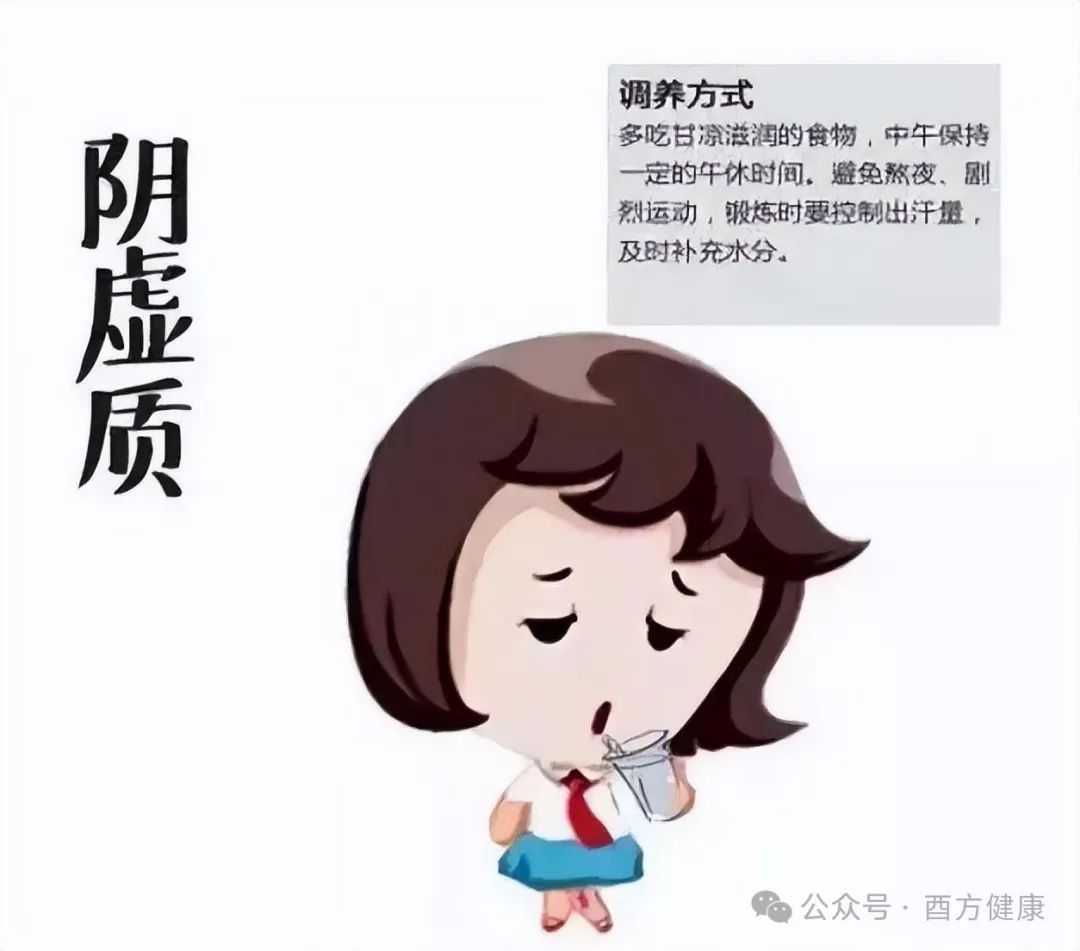
Overall Characteristics:More common in women, often characterized by low internal moisture and lack of nourishment. Body is slender with warm palms and soles, prone to dry mouth and throat, prefers cold drinks, eyes are dry, skin is dry, lips are dry and red, complexion is flushed, with a feeling of heat, prone to wrinkles, dizziness, tinnitus, poor sleep, energetic, can endure; insomnia, restlessness, easily irritable. Urine is scant and yellow, stools are dry; tongue is red, lacks moisture and coating, pulse is thin and wiry or rapid. Personality is irritable, extroverted; prone to yin deficiency heat syndromes, or after illness, easily manifests yin deficiency symptoms; intolerant to heat and dryness, tolerates winter but not summer.
From an appearance perspective, individuals with Yinxu Constitution are often not prone to obesity. They can consume sweet fruits like grapes, persimmons, snow pears, apples, and watermelons; crabs are also suitable, paired with ginger juice and perilla leaves to alleviate their cold nature; they can also eat duck, sea cucumber, cuttlefish, turtle meat, and soft-shelled turtle meat.
5. Phlegm-Damp Constitution
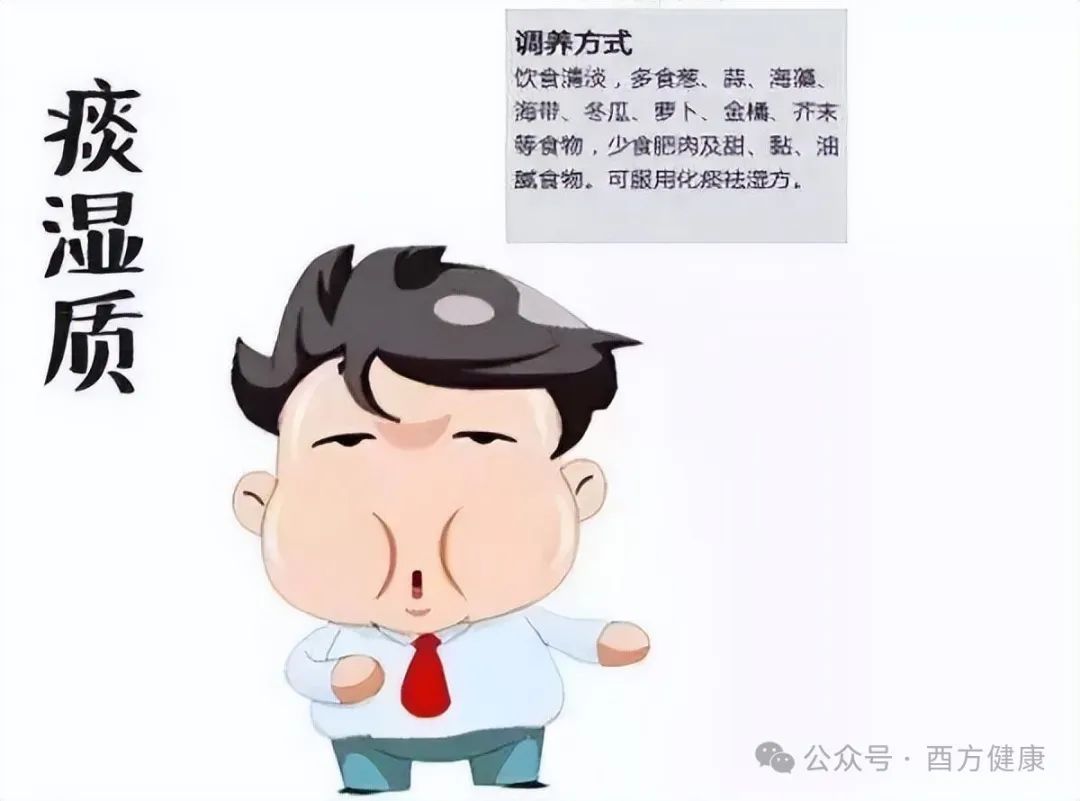
Overall Characteristics:Phlegm and dampness accumulate, characterized by obesity, fullness in the abdomen, and a greasy coating on the tongue;
Body is fat with a large abdomen, facial skin is oily, excessive and sticky sweating, complexion is pale yellow and dark, eyelids are slightly swollen and prone to drowsiness, chest tightness and fullness, mouth is greasy or sweet, phlegm is abundant, body feels heavy and uncomfortable, prefers fatty and sweet foods, bowel movements are normal or loose, urination is scant or slightly turbid, personality is mild, often patient, tongue is large with tooth marks, coating is white and greasy, pulse is slippery. Prone to diabetes, stroke, chest obstruction, etc. Poor adaptability to humid environments and rainy seasons.
Drinks, especially those high in sugar, should be avoided. Astringent foods, such as hawthorn, are recommended. Individuals with Phlegm-Damp Constitution should appropriately eliminate dampness while protecting the spleen and stomach, and regulate qi. The diet should be light, recommending foods like Chinese yam, white lentils, coix, red beans, crucian carp, and ginger.
6. Damp-Heat Constitution
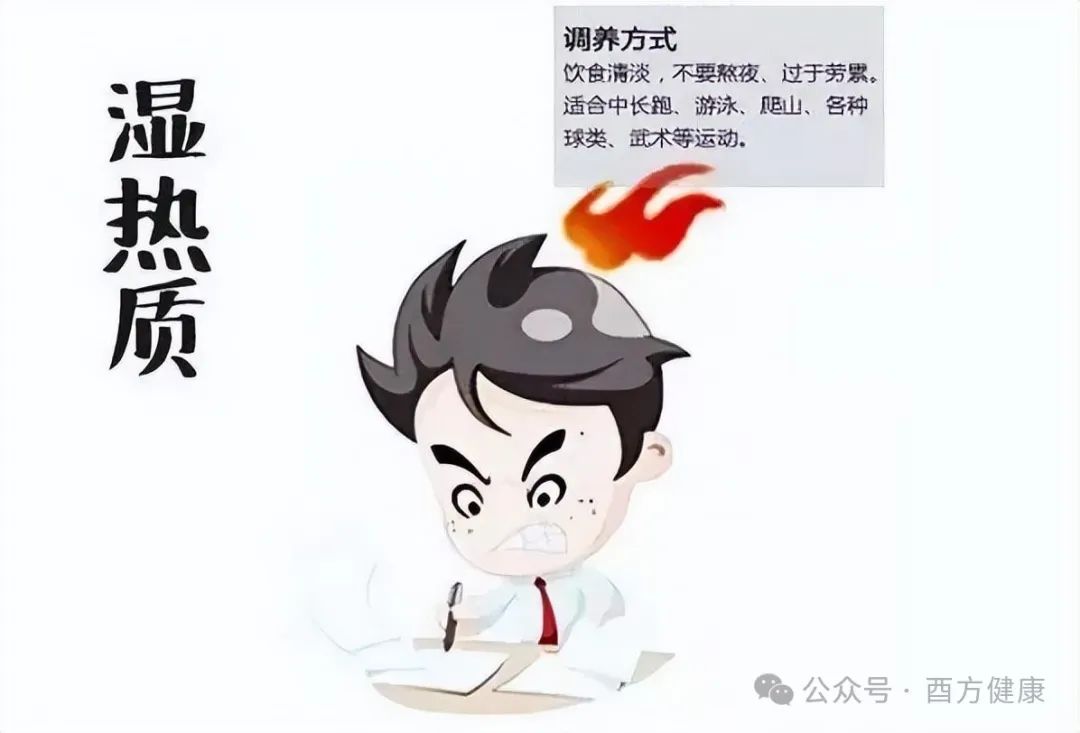
Overall Characteristics:Body is either overweight or thin, skin is oily, prone to acne, body feels heavy and fatigued, irritability, red eyes, bad breath; strong body odor; stools are dry or sticky and uncomfortable, foul-smelling; urine is yellow; excessive vaginal discharge, yellow in color, with frequent itching of the vulva; personality is irritable and easily angered. Complexion is oily, prone to acne and pimples, body feels heavy and fatigued, stools are sticky and uncomfortable, men may have dampness in the scrotum, women may have foul-smelling yellow discharge, tongue is red with yellow greasy coating, pulse is slippery and rapid. Prone to acne, jaundice, dysuria, and heat syndromes. Poor adaptability to high temperatures and humid climates.
The adjustment method is to cut off the source of damp-heat, preventing further generation of damp-heat. In terms of diet, it should be light and damp-eliminating, avoiding sweets, sweet drinks, and spicy foods, and can consume mung beans, winter melon, loofah, red beans, and watermelon to eliminate dampness.
In terms of lifestyle, avoid staying up late; it is best to wear natural fibers to protect the skin, such as cotton, linen, and silk. Additionally, try to avoid working or living in humid environments.
7. Blood-Stasis Constitution

Overall Characteristics:
Commonly seen in thin individuals, generally with a dull complexion, skin is dark or pigmented, tongue is dark with spots or patches of stasis, prone to spots and acne; hair is prone to falling out; complexion is dull, lips are dark, eyes have red veins; mood is depressed and dull, pulse is thin and choppy or irregular; women often experience dysmenorrhea, amenorrhea, or heavy menstrual bleeding with clots, or dark purple menstrual blood with clots. Prone to irritability, forgetfulness, and diseases such as pain, bleeding, stasis, stroke, and chest obstruction, intolerant to wind and cold.
Blood-stasis Constitution is mainly related to the liver’s inability to disperse blood. The liver is responsible for storing blood, and if liver qi is often stagnant, it gradually forms a blood-stasis constitution. This constitution should focus on protecting the liver and promoting liver qi.
In daily life, one can consume hawthorn, leeks, brown sugar, mushrooms, kumquats, black fungus, and drink rose tea; also can use angelica, which both nourishes and invigorates blood, blood deficiency can be replenished, blood stasis can be invigorated, women are particularly prone to issues related to blood stasis; avoid consuming astringent, cold, and raw foods, and prevent the body from getting cold, as this can exacerbate the constitution and trigger diseases.
8. Qiyu Constitution
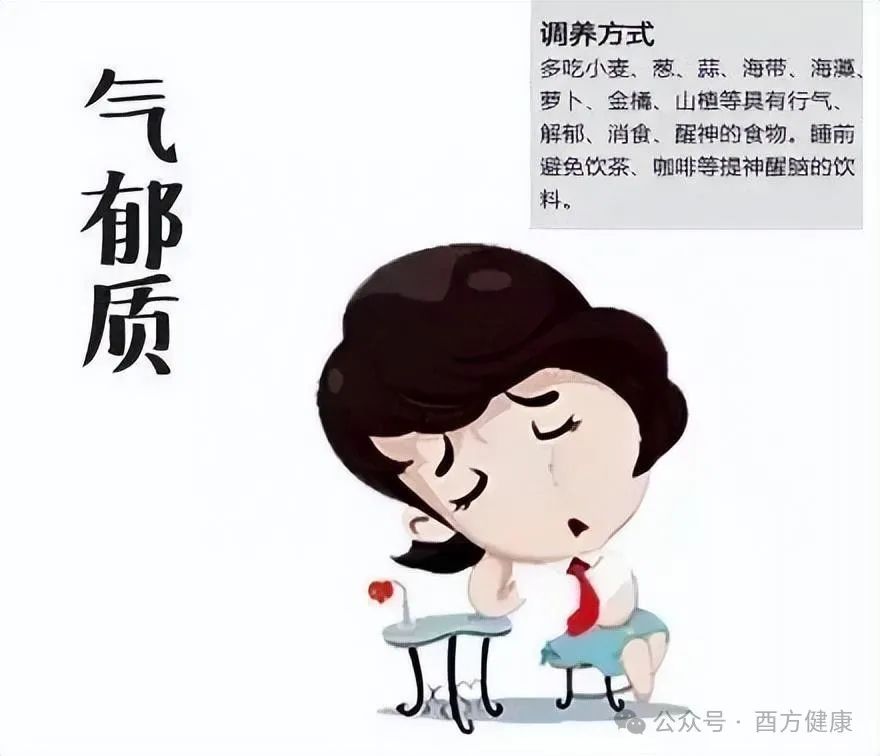
Overall Characteristics:Characterized by qi stagnation, primarily manifested as depression, anxiety, and fragility.
Body is often thin, generally feeling anxious and unhappy; chest and sides feel full or painful, often accompanied by sighing, poor sleep, reduced appetite, complexion is yellow and lacks luster, in severe cases, complexion may appear bluish-yellow; poor tolerance to mental stress, often feeling down, with chest tightness and sighing, sleep is also poor. Bowel movements are often dry, urination is normal, tongue is pale red, coating is thin and white, pulse is thin and wiry; personality is introverted; prone to depression, organ disorders, insomnia, globus hystericus, and panic attacks, with poor tolerance to mental stress, dislikes rainy days.
Qiyu Constitution is common among individuals with high work pressure, such as white-collar workers and administrative personnel, especially among women.
Individuals with Qiyu Constitution should focus on soothing the liver and regulating qi, especially women. In terms of diet, they can consume lemon water, oranges, dried tangerine peel, onions, and loofah. Attention should be paid to emotional regulation, listening to cheerful and uplifting music, traveling, and making friends with cheerful people.
9. Special Constitution

Overall Characteristics:May have deformities, congenital physiological defects, allergic reactions, hereditary diseases, congenital diseases, and fetal transmission diseases, with varying characteristics due to specific constitution; prone to allergies, susceptible to conditions like “five delays,” “five weaknesses,” “fetal fright,” and “fetal weakness”; poor adaptability, easily triggering chronic diseases.
Individuals with Special Constitution are very sensitive and easily develop allergic reactions and allergic diseases. For example, they may sneeze continuously upon smelling strange odors or flower pollen; during seasonal changes, colds seem to visit frequently.
In daily life, consume warming and nourishing foods, especially in winter, individuals with Special Constitution should prefer warming and neutral foods, such as corn, black rice, glutinous rice, radishes, Chinese yam, sweet potatoes, chestnuts, lamb, red dates, and peanuts; soups and porridge can be supplemented with rehmannia, astragalus, dried ginseng, ophiopogon, and goji berries.

Everyone should pay attention to the internal connection between different constitutions and diseases and symptoms, implementing the principle of “tailoring to the individual” in practice, adjusting the body’s yin and yang dynamics based on different constitution types or states, whether tonifying qi, nourishing yin, warming yang, eliminating dampness, relieving stagnation, or promoting blood circulation, reflecting the treatment principle of “people-oriented” and “treating the root of the disease”; early detection and intervention of constitution deviations, conducting etiological prevention, preclinical prevention, and clinical prevention, achieving quality adjustment to reject pathogens, prevent diseases, and prevent changes, embodying the TCM principle of “preventing disease before it occurs”.
Warm reminder: This article is sourced from the internet for reference only; if you have any diseases, please seek medical attention promptly offline.

